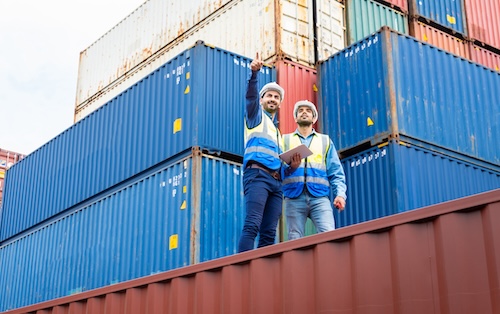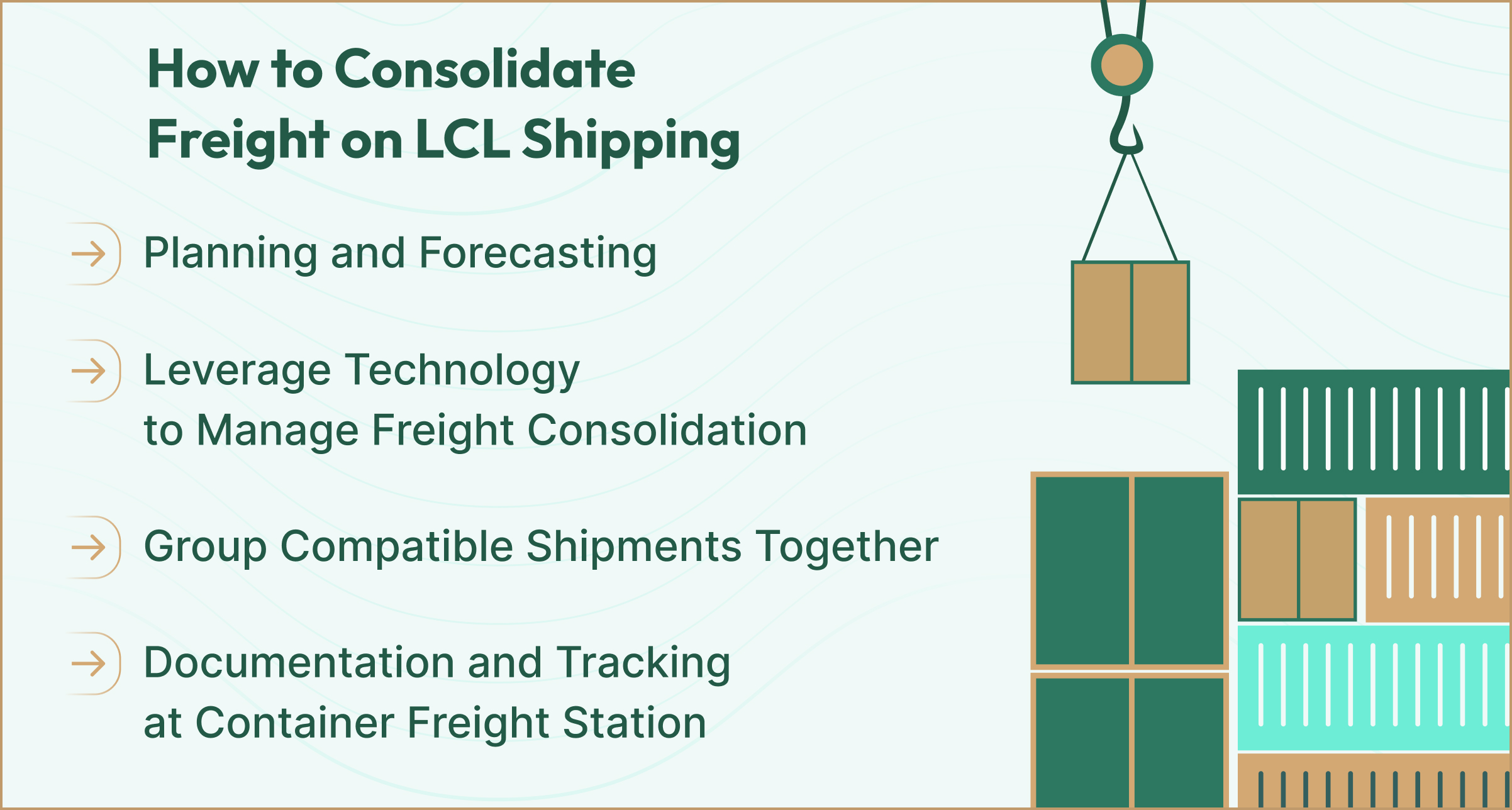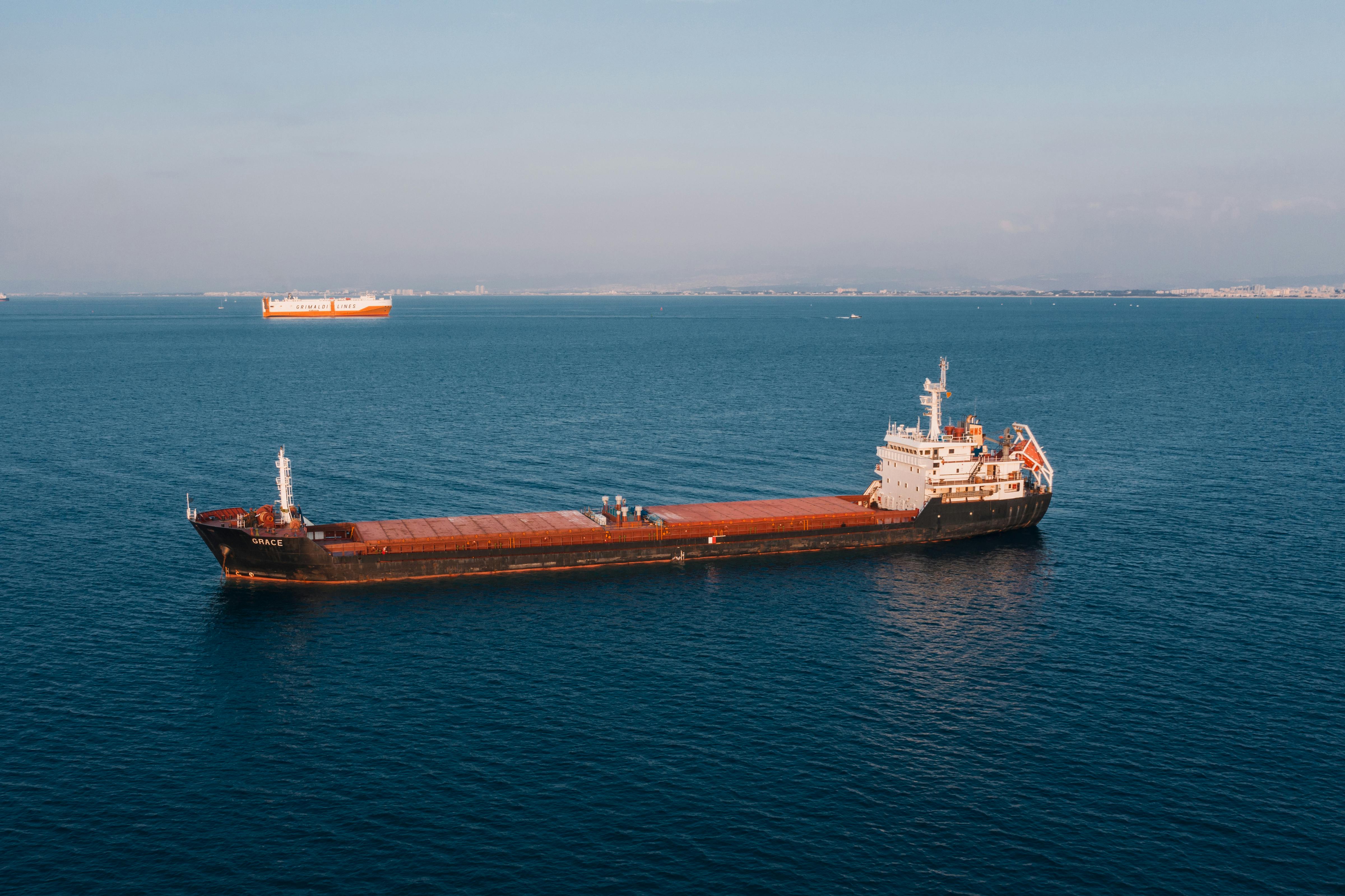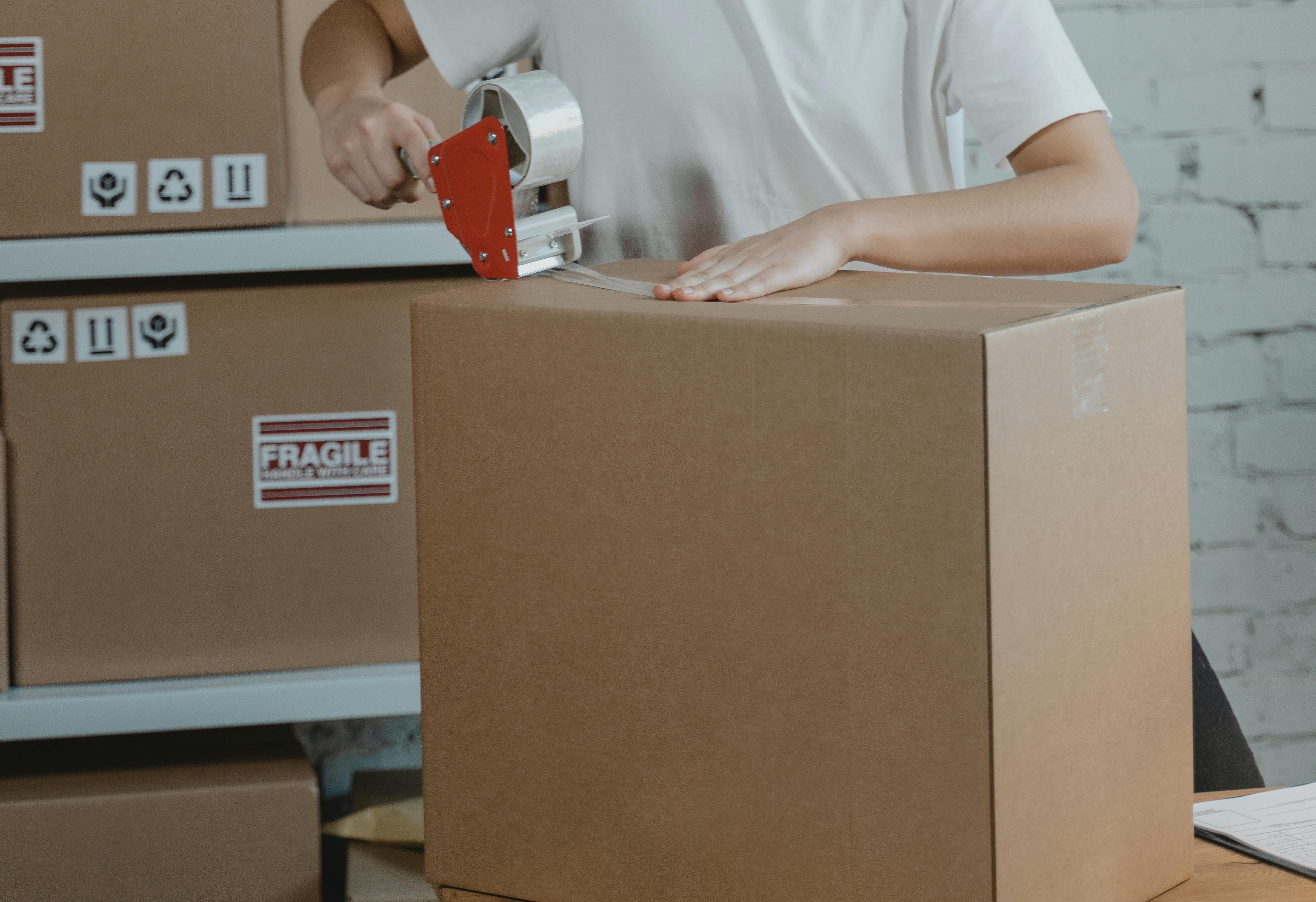How To Consolidate Freight for Efficient Operations with LCL Shipping

A successful LCL shipping is all about freight consolidation, but it must be done correctly.
By its nature, LCL shipping allows businesses and supply chains to transport smaller shipments without paying the full FCL shipping fee. It also allows these supply chains to send out shipments consistently without worrying about getting a full container load. As an effective shipping solution, it enables smaller businesses and e-commerce brands to compete by leveraging lower costs to transport their goods. Big shippers use LCL shipping as well, to ensure they stay nimble to market demand with precision orders that can keep inventories lean.
However, the trick to a good LCL experience lies in a freight forwarder's skill to consolidate cargo from several businesses and shippers.
Factors To Look at While Shipping via Less Than Container (LCL) Freight

Freight consolidation is critical to LCL shipping as it puts together smaller shipments to make up a full container load, without needing individual shippers to pay for the entire container.
However, as a shipper leveraging LCL shipping, it is important to get the right freight forwarder who can help manage the entire LCL transportation, including consolidation. Getting the right freight forwarder goes beyond requesting quotes from multiple freight forwarders to choose the best price. The right freight forwarder will help you understand market rates and LCL shipping charges and operations.
In LCL logistics, all of this is critical because of the following:
1. Cost Savings
Shippers transporting smaller shipments do not have to pay for a full container load.
However, this is where the freight forwarder helps. Shippers can share the cost of one full container load and still get the freight to the destination without any difficulty, nor do they have to bear the full burden of the costs. Choosing a good freight forwarder means better rates, zero damages, and reduced delays or, in some cases, none at all.
LCL cargo shipping offers cheaper logistics solutions for shippers, small businesses, and e-commerce platforms on tight budgets. It is also preferred by big shippers who believe in holding leaner inventories, allowing them to stick to a consistent shipping schedule of ‘smaller’ shipments.
All of this is possible through consolidation.
2. Streamlined Logistics
LCL logistics are susceptible to delays because the freight forwarder has to manage several shipments in the same container.
When done poorly, one or more shippers are bound to have challenges that could be due to longer lead times, damages, and a generally poor shipping experience. But with the right freight forwarder, all those are non-existent. The right freight forwarder can manage consolidation such that the cargo is filled from the port of origin and not tampered with or reopened until it gets to the destination port. Managing all of this will help all the shippers involved in the LCL operation streamline their logistics process because they are sure the cargo will arrive on time and there won’t be damage.
3. Better Inventory Management
Beyond logistics, consolidation in LCL freight allows for effective inventory management.
This means maintaining a consistent shipping process in which all the necessary inventory is transported on demand without having to wait to fill a full container load. In today's supply chain landscape, where speed rules, waiting for enough demand to fill an entire container is probably not the right approach for a shipper. LCL shipping allows shippers to avoid the cost of holding inventory because they can be sure that the shipments arrive on time and when needed, meaning the supply chain can stay nimble and reactive to market changes.
But beyond always having enough inventory, consolidation allows for effective planning and a more nuanced inventory management style.
How To Consolidate Freight on LCL Shipping

Consolidation is a critical aspect of LCL shipping. It is a key ingredient in making the entire LCL operation worth the effort.
However, although consolidation has many advantages, it has to be done effectively before any of those become inherent. For larger volumes, shipping FCL (full container load) offers benefits such as faster transit times and lower chances of damage compared to LCL (less than container load) shipments. It is an effective consolidation of LCL shipments that levels the playing field. And the key to that is to have a system and a freight forwarder that efficiently manages the entire process.
Consolidation is a freight forwarder’s responsibility, and picking the right one means that the freight forwarder can do the following:
1. Planning and Forecasting
Because consolidation involves more than one shipper, it is necessary to plan the process effectively to allow for the effective execution of the process.
Planning and forecasting will help predict and maximize opportunities. Through planning and forecasting, the freight forwarder knows what to expect from shippers and when to expect it. This way, they can plan with the available space to ensure that shipments fit together and all shipper's demands and nuances are accommodated effectively without impacting the operation.
Like every other supply chain aspect, effective planning and forecasting is an efficient tool for process optimization.
2. Leverage Technology To Manage Freight Consolidation
Technology plays a critical role in consolidation because it enhances and streamlines the entire process.
Consolidation brings together different shipments and freight forwarders have to consider cargo dimensions, demand nuances, and different packaging. The process can be quite complicated and will, in many cases, be time-consuming. However, there is a need to manage the process to allow all shipments to share the same container without hassle.
This is where technology solutions like load planning applications play a critical role. They allow the freight forwarders to optimize the container space by considering the dimensions and weight of various goods. The entire consolidation process is done much faster and more effectively through technology.
3. Group Compatible Shipments Together
Because there are different shippers trying to leverage the LCL operation, it stands to reason there will be different types of shipments.
However, for a more successful LCL shipping process, grouping compatible shipments together in the same container is critical. Doing it this way helps freight forwarders avoid damage, and it helps balance the weight of the container. Beyond that, it is also important to group these shipments according to location, delivery, and time frames to ensure there are no delays in the LCL freight.
When grouping compatible shipments together, picking up goods and sorting techniques with the aid of technology can be vital.
4. Documentation and Tracking at Container Freight Station
Just like FCL cargo, there needs to be adequate documentation to back up freight moving via LCL.
It is important to note that when a container is carrying different shipments, customs authorities will want to know everything they can about the container. This is why documentation is critical. It will help freight forwarders explain the origin and destination of each of them without having to go through more stringent processes. If the documentation is clear and intact, the entire LCL logistics will go off without a hitch. It also makes the freight forwarders' task so much easier.
Proper documentation will prevent delays, fines, and other stringent penalties, but shipment tracking will enhance transparency.
As a shipper, you may be bothered or concerned about the consolidation process, but it is important to find a freight forwarder who can ensure seamless consolidation because it will impact the overall LCL shipping and supply chain experience. With Silq, you have a freight forwarder that has an effective consolidation strategy and works with you at every step of the supply chain to ensure a seamless and safe logistics process.
Potential Dangers of Consolidation
When not done well, the consolidation process can lead to all sorts of problems for shippers. Some of these problems or challenges could disrupt the entire shipping and supply chain process. The possible dangers from poor consolidation are:
1. Increased Lead Times
Lead times could be extended because the consolidation process is taking too long or because of delays and inefficiencies at the container freight station. Sometimes, the delays can affect the entire operation. Longer lead times lead to unhappy customers and ineffective logistics processes.
2. Inventory Management Challenge
A poor consolidation process will cause delays, which will impact the business's inventory management, leading to insufficient inventory for the supply chain to meet customer demands.
3. Exposure To Damages
Poor grouping in the consolidation process can cause inefficient management of space and arrangement, leading to poor weight balance that potentially results in shipment damage. Transloading to load and unload the LCL container partially can increase exposure to damage. This is why shippers have to be extra diligent when choosing a freight forwarding platform, to ensure there is effective consolidation.
How Zen Woods is Leveraging Silq’s Direct LCL Cargo For An Effective Shipping Operation
Zen Woods is a furniture maker with vendors across the Americas, Europe, and Asia.
This meant that the company was always shipping to and from each of these continents. However, the company began having challenges with cost, frequent shipment damages, and a below-par freight forwarder relationship.
Zen Woods was always using LCL shipments, but its freight was prone to delays and, in some cases, damages to part or the entire shipment, costing the business dearly. The company was considering going via the FCL route due to its freight forwarder making a mess of the entire LCL operation. Zen suspected this to be due to the forwarder’s issue with consolidation.
It wasn't until one of the executives engaged in a conversation with a Silq manager that they were introduced to Silq’s LCL service. Silq not only took consolidation seriously but excelled at it. This was a game-changer for Zen Woods. The company no longer had to rely on the FCL service unnecessarily, as it often struggled to fill an entire container. With Silq’s efficient consolidation, Zen Woods could optimize their shipments, ensuring cost-effectiveness and timely deliveries.
Through consolidation, the company had a chance to save significantly on shipping and logistics operations. More than that, though, it did not have to constantly wait or delay shipping to fill up an entire container to get the most out of the full container load service. The damages were a thing of the past because Silq was able to group similar shipments and guarantee cargo safety. That meant more savings and faster inbound shipments.
Why Shippers Need Silq’s LCL Freight Service and Freight Forwarder
With Silq, there are no surprises in your shipping. Doesn’t matter if it is air freight or ocean freight. The company combines factory inspections and freight forwarding to make your deliveries more predictable. One of the most common solutions offered by Silq is the LCL cargo service, which has been a game changer for supply chains across the globe. Now, smaller businesses can compete through cheaper shipping solutions by leveraging the Silq platform.
Get started with us now.
Ready for Supply Chain Predictability?
Importers using Silq ship smarter, safer, and with total control.







